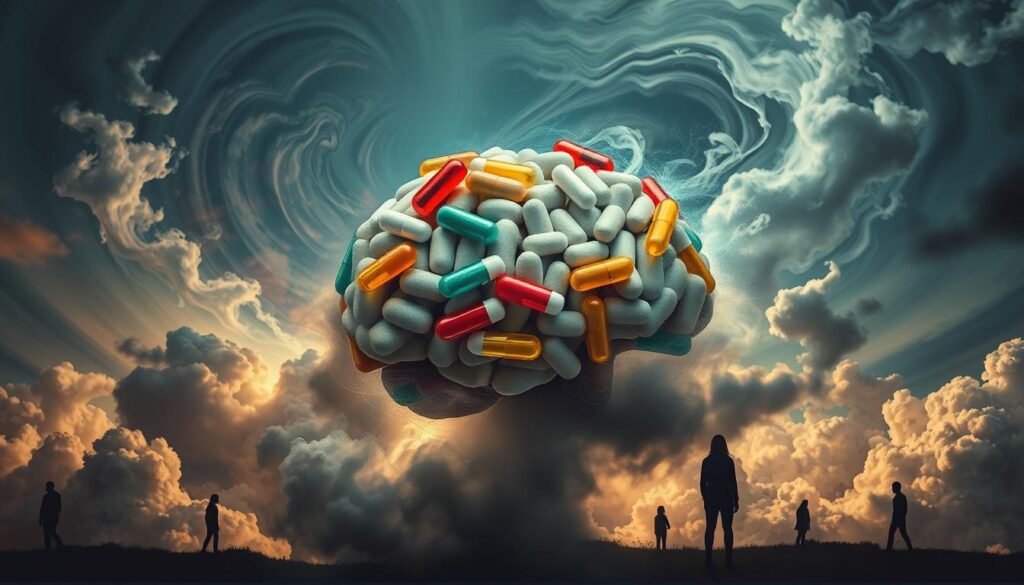Did you know nearly 40 percent of women with a sexual disorder also face depression? This shocking fact shows how mental health and sexual well-being are closely linked. Depression affects more than just our emotions. It can also cause a big drop in sexual desire. This article looks into how depression and low sex drive are connected. It explains why understanding this can help find better treatments and improve relationships.
Key Takeaways
- Depression impacts many parts of life, including your sex drive.
- Major depression often leads to changes in how much desire you feel.
- Women are nearly twice as likely as men to be majorly depressed.
- Many women with low desire also struggle with depression.
- Good treatment can make both mental and sexual health better.
- Keeping up sexual activities might help recovery from depression.
- There are many ways to treat this, like therapy and medicine.
Understanding Depression
Depression can really change how a person feels inside and out. Knowing the symptoms of depression and the causes of depression helps a lot. It makes managing this issue easier for someone’s mental health.
Symptoms of Depression
The signs of depression can be both emotional and physical. People might face:
- Persistent feelings of sadness and hopelessness
- Fatigue or a lack of energy
- Changes in appetite, either increased or decreased
- A marked loss of interest in activities once deemed enjoyable, including sex
When someone stops liking what they used to, it’s a big warning. This affects work, personal life, and even sex. Johns Hopkins Medicine found about 21% of women deal with major depression sometime. That shows how key it is to notice these clues.
Causes of Depression
Depression comes from many places. Things that can make it happen include:
- Stressful life events, like losing someone close or money troubles
- Hormonal changes messing with mood
- Brain chemicals affecting happiness and reward feelings
- Relationship problems making loneliness worse
It’s important to tackle these reasons. Knowing how mental health ties to feeling sad helps in getting better. For more on how lacking close relationships affects mental health, check this resource.
| Common Symptoms | Percentage of Affected Individuals |
|---|---|
| Feelings of Sadness | 70% |
| Fatigue | 58% |
| Loss of Interest in Activities | 70% (without medication) |
| Changes in Appetite | 25-30% |
The Connection Between Depression and Low Sex Drive
The connection between your mood and your interest in sex is complex. Depression can make you less interested in sexual activities. This can cause problems in your relationships and how you connect with others. It’s important to know how depression affects your desire for sex.
How Depression Affects Libido
People with depression often feel very tired and not interested in many activities. This includes sex. The number of people losing interest in sex because of depression is quite high. A survey from 1994 found that about 33 percent of women and 17 percent of men felt less interested in sex. More than 70 percent of those feeling down also felt less interested in sex, even without medication. This was often more upsetting than other symptoms of depression. People with major depression or bipolar disorder often have serious issues with their sexual function.
Impact on Relationships
A low interest in sex can cause problems and misunderstandings in relationships. This situation can make partners feel bad about themselves. It creates a cycle where depression causes issues in the relationship and also makes it worse. Studies show that people taking SSRIs for depression are much more likely to report sexual problems. Medicines like Celexa, Paxil, Prozac, and Zoloft can lead to erectile dysfunction and other issues. Talking openly about these effects can help couples understand each other better. They can then look for ways to solve these problems, like going to therapy. To learn more about how depression affects your sex life, you can visit this resource.
| Condition | Percentage Affected |
|---|---|
| Depressed patients experiencing libido loss | 70% |
| Depressed males with decreased sexual desire | 62.5% |
| Patients taking SSRIs reporting sexual dysfunction | 30-40% |
| Reported improvement in sexual satisfaction post-treatment with escitalopram | Variable |
Recognizing Sexual Dysfunction
It’s vital to understand sexual dysfunction. It often goes hand in hand with mental health issues like depression. People facing these problems should learn about the different kinds of sexual dysfunction.
Types of Sexual Dysfunction
There are various types of sexual dysfunction, such as:
- Decreased libido
- Erectile dysfunction
- Difficulty achieving orgasm
Hormonal imbalances and psychological factors like depression and anxiety play a big role. Up to 75% of people with Major Depressive Disorder (MDD) suffer from sexual dysfunction. It shows why early recognition is key. For more details on how common sexual dysfunction is in MDD patients, check this article.
Signs of Low Libido
Knowing the signs of low libido is crucial. Some common signs are:
- Absence of sexual fantasies
- Avoidance of sexual activity
- Lack of interest in physical affection
Being aware helps in starting conversations about sexual health. Women with depression are more affected by sexual dysfunction than men. Recognizing and managing these problems is important. This way, both mental and sexual health improves. Many women believe sexual health is key to their overall well-being.
Gender Differences in Depression and Sexual Desire
Gender differences play a big role in understanding sexual desire and its problems. Depression affects everyone, but men and women feel it in different ways. These differences impact their sexual desire and happiness.
How Men and Women Experience Depression Differently
Men often show irritability and anger when they’re depressed. Women might feel more emotional pain. This leads men to report their feelings less because society often doesn’t talk openly about mental health. And this silence can make it hard to discuss how their sadness affects their desire.
Statistics on Depression in Women vs. Men
Depression affects genders differently. Studies show that depression hits women almost twice as much as men. Up to 25% of women might get depressed in their life, compared to 12% of men. And 61.9% of those with major depression face troubles in their sexual life. It’s even more common in women, with 75.3% experiencing these issues, unlike 38.4% in men.
- In the United States, about 43% of women and 31% of men face sexual challenges.
- Nearly 70% of adults with untreated depression have libido problems.
- Women’s symptoms are often tied to hormone changes. This makes their depression and libido issues more complex.

Knowing about the differences in depression between genders is key to treating mental and sexual health. Working on these problems can help improve happiness and sex life for both men and women.
Hormonal Influences on Libido
Hormones play a big role in shaping our sexual desire. This is true for both men and women. Different stages in life, like menopause, pregnancy, and breastfeeding, bring about big hormonal changes. These changes can affect our libido. During menopause, for instance, up to 40% of women report a drop in sexual desire. This drop is mostly because of a significant imbalance in hormones.
Testosterone is very important for women’s libido. Research shows that by menopause, women’s testosterone levels can drop by about 50% from their peak. This drop can lead to conditions like Hypoactive Sexual Desire Disorder (HSDD). A survey of over 31,000 U.S. women found that those over 45 were more likely to report low libido.
Estrogen also affects sexual desire. It impacts genital function and how we perceive sensory information. Not having enough estrogen can cause issues like dryness. Mood issues, like depression, can also lower libido. These hormonal effects, together with lifestyle and emotional factors, make sexual health complex.
A table summarizing key hormonal influences is presented below:
| Factor | Impact on Libido |
|---|---|
| Menopause | Reduces testosterone and estrogen levels, leading to low libido |
| Pregnancy | Hormonal fluctuations may increase or decrease sexual desire |
| Stress (Elevated cortisol) | Can lead to hormone imbalance, resulting in diminished libido |
| Oral Contraceptives | May lower testosterone levels, affecting sexual desire |
| Thyroid Function | Low thyroid levels can contribute to decreased sexual desire |
It’s crucial to understand these hormonal effects to treat libido changes successfully. Tailored treatments, like hormone replacement therapy, can help many women.
Antidepressants and Their Side Effects
Antidepressants help with depression but can have side effects. Sexual dysfunction is a common issue. Knowing about these side effects helps choose the best medicine.
Common Antidepressants Affecting Sex Drive
Many antidepressants can decrease sexual desire. SSRIs are known for this. Here’s a list of antidepressants and how they might affect sexual function:
| Antidepressant | Prevalence Rate of Sexual Dysfunction |
|---|---|
| Zoloft (sertraline) | 27.43% |
| Effexor (venlafaxine) | 24.82% |
| Celexa (citalopram) | 20.27% |
| Paxil (paroxetine) | 16.68% |
| Prozac (fluoxetine) | 15.59% |
| Tofranil (imipramine) | 7.24% |
| Nardil (phenelzine) | 6.24% |
| Cymbalta (duloxetine) | 4.36% |
Sexual side effects can include low libido, erectile dysfunction, or issues with orgasm. Tackling these problems is important for patients’ well-being and relationships.
Finding the Right Medication
Choosing the right medication requires talking to healthcare providers. Wellbutrin (bupropion) might be a good option due to fewer sexual side effects. For ongoing sexual dysfunction, drugs like Viagra (sildenafil) or Cialis (tadalafil) could help.
Trying lower doses could also work well. Alternatively, moclobemide or agomelatine may reduce sexual dysfunction. Always talk to a doctor before changing medications or to manage side effects.

Treatment Options for Depression and Low Sex Drive
There are various ways to tackle depression and low sex drive. Each one is customized for the person’s needs. They aim to reduce symptoms and improve sexual health.
Cognitive Behavioral Therapy (CBT)
Cognitive Behavioral Therapy helps people change their negative thoughts. These changes help with depression and low libido. It teaches coping methods and promotes healthier actions.
Patients learn to better their mental health and sexual desire. This improves their life quality.
Medication Management
Choosing the right medication is key for treating depression and sexual problems. Antidepressants affect people differently, especially in sexual matters. SSRIs might cause more sexual side effects than others.
Bupropion and mirtazapine are often better choices. Adjusting medicines can lessen unwanted effects, aiding in both mood and sexual health.
Alternative Therapies
Alternative therapies offer more options for recovery. Practices like mindfulness and acupuncture heal both mind and body. They help with stress and make you more aware of your desires.
These therapies might boost treatment success. They help individuals feel connected to their desires.
| Treatment Option | Description | Benefits |
|---|---|---|
| Cognitive Behavioral Therapy | A structured, problem-focused therapy aiming to modify negative thought patterns. | Improves coping strategies, enhances sexual desire. |
| Medication Management | Utilization of antidepressants with lower sexual side effects. | Minimizes adverse effects, improves mood and libido. |
| Alternative Therapies | Holistic treatments like mindfulness and acupuncture. | Encourages relaxation and enhances self-awareness. |
Learn more about depression and its impact on the brain here.
Psychological Counseling and Its Importance
Psychological counseling is key for treating depression and low sex drive. It doesn’t just look at emotions but also supports mental health. Therapy improves how we talk to our partners about intimate issues.
By 2024, CACREP standards will include training on sexual development for counselors. This means they’ll handle sexual wellness talks better. The PLISSIT model gives them a clear way to address sex-related worries.
It’s important to deal with sexual dysfunction since it can come from depression or anxiety. Depression can make sexual desire drop, and anxiety can interfere with sexual activities. Through counseling, people explore how race, gender, and class affect their sex life. This helps them grow in their sexual identity.
Knowing the barriers in talking about sex ensures ethical counseling. If counselors are open to these talks, it can greatly help clients. This openness can ease the stress of low libido and other sexual issues.
| Aspect | Impact of Counseling | Psychological Effects |
|---|---|---|
| Communication Skills | Enhances open dialogue between partners | Reduces misunderstandings and resentment |
| Emotional Support | Provides a safe space to express feelings | Alleviates feelings of shame or guilt |
| Sexual Education | Informs clients about sexual health | Improves self-esteem and body image |
| Therapeutic Alliance | Builds trust and encourages honesty | Supports healthier coping mechanisms |
Dealing with Relationship Challenges
Navigating through relationship hurdles is tough when dealing with depression and low sex drive. It’s common for partners to feel stressed and anxious. This can hurt how they connect on an emotional and physical level. Talking openly about feelings and worries is key to creating a supportive space.
Communicating with Your Partner
Good communication is crucial when facing relationship problems. It’s important for partners to talk about their struggles. Discussing how depression affects intimacy is vital. Sharing feelings can lessen uncertainty and make emotional bonds stronger.
Talking about sexual needs can help solve issues. When partners express their emotions and listen to each other, it strengthens their bond. This clear communication reduces doubts, making the relationship stronger.
Rebuilding Intimacy
Rebuilding intimacy isn’t just about physical touch. Simple acts like holding hands and giving compliments help in creating a warm atmosphere. Doing everyday tasks together keeps the feeling of unity alive. These actions show support and help connect on a deeper level.
Adding tender gestures and shared moments reduces stress. This helps bring partners closer, letting the relationship grow. Challenges like depression don’t stand a chance against such strong bonds.
Maintaining a Healthy Sex Life Despite Depression
Depression can deeply impact someone’s sexual well-being. Knowing how to cope is key to keep a healthy sex life during such times. It’s crucial to keep intimacy and communication alive. This way, partners can deal with changes in sexual desire together.
Strategies for Coping
Keeping a routine can be useful. Small acts of physical touch, like cuddling, help maintain a connection. It is important for couples to find different ways to stay close. Activities that build emotional intimacy can make the relationship stronger.
Sharing hobbies or quiet moments together can boost satisfaction in the relationship.
Understanding Individual Needs
It’s vital to know everyone has their own needs in a relationship. Honoring these differences helps partners feel more relaxed. Talking about sexual and emotional needs brings partners closer. This way, they can adjust to each other’s changing desires.
It’s not all about how often you’re intimate, but the quality that counts. Both partners should feel important and connected. Trying regular exercise and therapy, like cognitive behavioral therapy, can also help a lot.

Conclusion
The link between depression and low sex drive is crucial to understand. Studies show that a big percentage of men and women face less interest in sex. For many, this also means dealing with sexual problems. This affects not just their private life, but their overall happiness.
It’s vital for people and their partners to talk about these issues kindly and openly. This approach can make a big difference.
Getting help from experts is key in tackling depression and low sex interest. Treatments like therapy, medicines, and other methods can help a lot. They make better intimacy possible. Paying attention to mental health helps build stronger connections and better sex lives.
Being active in seeking solutions helps everyone involved. Understanding the problem fully and being open to treatment choices can improve things. This can lead to a happier sex life, even with the challenge of depression.